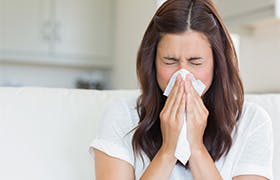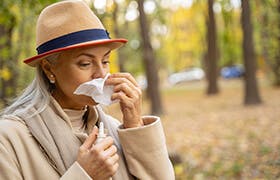
Nasal Congestion: How to Clear Your Blocked Nose
Suffering from a stuffy, blocked nose? Not only is the inability to breathe through your nose inconvenient, but it can also affect your sleep and mood if it lasts for a long time. It can also sometimes signal an underlying illness or health condition.
So, how can you unblock your nose when nasal congestion strikes? Learn about ways you can clear your airways, what happens when your sinuses are congested, and what could be causing your stuffy nose here, with Otrivine.
What is Nasal Congestion?
You have nasal congestion when your breathing through your nose is obstructed or blocked. Reasons for nasal blockages can include mucus, swollen blood vessels, sinus infection, inflammation, polyps, and more.
What Causes a Blocked Nose?
Nasal congestion can come about for several reasons, the most common being:
- Colds: one of the first signs of an incoming cold is often a blocked, stuffy, runny nose. The common cold affects many of us each year, usually in the colder months. Luckily, they usually clear up by themselves in 1-2 weeks.
- Non-allergic rhinitis: this is the name given to inflammation inside the nose that isn’t caused by allergies like hay fever or animal dander. Causes for this condition include a viral infection, poor air quality, and hormone changes.
- Allergic rhinitis: being allergic to pollen, dust, and animal dander are frequent causes for a blocked and snotty nose. Allergies that affect the nose – also known as allergic rhinitis – are common in the UK, with about 1 in 5 people experiencing symptoms.
- Sinusitis: if you’re suffering from a blocked nose, sinus pressure, and/or swelling in your cheeks, eyes, and forehead, you may have sinusitis. This sinus infection normally clears up on its own within 2-3 weeks but can be treated with decongestant nasal sprays or drops.
- Nasal polyps: harmless growths inside your nasal passage can cause a nose blockage. If left untreated, they can restrict breathing through your nose, causing snoring, nosebleeds, and reducing your senses of smell and taste.
- Catarrh: catarrh is a condition that can cause a blocked or stuffy nose that, try as you might, you can’t clear. This is due to mucus filling airways and cavities, affecting the nose, throat, and sinuses. Catarrh is usually temporary, but some people have it chronically where it reoccurs often or lasts a long time.
How to Clear a Blocked Nose
The best way to unblock your nose largely depends on the cause of your congestion. However, there are a few tried and tested methods that can work to clear most blockages:
- Nose-blowing: sometimes, such as with colds, the only thing you need to do to clear your airways is regularly blow out the mucus in your nose until the virus passes. Always blow into a tissue, flush or bin it afterwards, and then wash your hands to prevent spreading the virus.
- Nasal rinses and washes: saline nasal washes can be used to flush out mucus and help you breathe through your nose. You can buy nasal washes such as Otrivine Natural Daily Nasal from most supermarkets and chemists. To use, lean head forward slightly and insert nozzle into the nostril. Spray while breathing gently through the nose. Repeat in the other nostril. Allow the product to act for a few minutes before wiping the nose or blowing the nose if needed.
- Antihistamines: antihistamines are medications that block the chemical, histamine, from being released by your body in response to an allergen. In people with allergies to pollen, dust or dander, the detection of these substances in the body causes the release of histamine, which causes allergic reactions like itchy eyes, congestion and a runny nose. Taking antihistamines when you feel a reaction coming on, for instance when there’s a high pollen count and you suffer from hay fever, can help you treat allergic symptoms like a blocked nose.
- Decongestants: decongestant nasal sprays and drops – like Otrivine – can help clear your airways by reducing the swelling in your nose’s blood vessels.
- Ask your pharmacist: if you’re not sure how to clear your blocked nose, staff at your local pharmacy can assess your symptoms.
- Visit your GP: conditions like nasal polyps, and other causes of nasal congestion that don’t get better with over-the-counter medication, may need medical treatment from a doctor. Visit your GP to determine the most appropriate treatment for you.
How Otrivine Helps Clear Nasal Congestion
Otrivine medicated nasal decongestants like Otrivine Congestion Relief Nasal Spray help to reduce swelling in the blood vessels in your nose to open up nasal passages. Some of our products, like Otrivine Extra Dual Relief Nasal Spray, contain ipratropium bromide to help reduce nasal mucus secretion to help you breathe your best.
Choose between drops, such as Otrivine Adult Nasal Drops, or sprays, like Otrivine Blocked Nose Relief Nasal Spray, depending on how you like to take your medicine. We recommend our sprays given that a measured dose is delivered. For children aged 6-12 years, we offer Otrivine Child Nasal Drops.
Blocked Nose FAQs
How can I get rid of a clogged nose naturally?
Try a saline nasal wash like Otrivine Natural Daily Nasal Wash. You can also use Otrivine Natural with Eucalyptus Nasal Spray to reduce nasal swelling.
Can I stop a blocked nose before it happens?
You can use Otrivine Natural Daily Nasal Wash to wash away allergens in your nasal passage to help prevent and treat a blocked nose. If you do find your nose blocked due to allergies, you can use a product like Otrivine Allergy Relief Nasal Spray to relieve it.
What causes a long-term blocked nose?
Nasal polyps, catarrh, chronic sinusitis, and other conditions can cause your nose to become blocked for a long time. Get checked by your doctor to determine the cause of your nasal congestion and the best way to unblock it.






